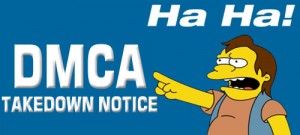DMCA takedown notices What DMCA attorneys don’t want you to know!
by Derek Gendron, March 28, 2008

DMCA takedown notices are powerful and often necessary tools to protect intellectual property. When we filed the Federal lawsuit against the sewing pattern companies and Digital River, we learned some legal tactics. Tactics by attorneys that spouted Digital Millennium Copyright Act claims. Some interesting approaches that twist the letter of the law to their favor.
A secret we learned about DMCA takedown notices!
Webhosts and ISP’s pay attention! One of the little known ways is going to be disclosed here.
The Federal government established a way for WebHosts to register their designated Copyright Agent with the US Copyright office. Many do not know about this and therefore, many do not register. The first thing a lawyer attempts to do when filing a DMCA complaint/lawsuit is to find leverage against the ISP hosting the website. If it refuses to take down an alleged offending website and it has not registered as its designated copyright agent, they use this as leverage against them. A sort of, do things my way or you will face charges for this approach…

Questionable leverage?
Now in most communities in the world, using this leverage against someone is considered extortion, blackmail or other interesting terms. In law, it’s research and helping enforce the laws on the books. Someone once said, ignorance of the law is not an excuse. As a result, it may appear questionable its just another thing on a checklist that needs to be done and done right.
The registration process to avoid this type of DMCA takedown complication is fairly simply. Download the PDF Form and fill it out. There is a fee to register your webhost/ISP, and it has been steadily increasing in cost each year so I anticipate that the fee will continue to rise. Registering now won’t protect you from a lawsuit or claim, but it will take one leg out of a lawyer’s claims against you. The less legs they have to stand on, the less briefs you will have to file.
Here is the Stick

Below is the carrot

Some of you may not want to register your host. While I don’t believe its enforced, it does give an opposing counsel a stronger case.
They can and will use this leverage.
And, they can use this information to go upline to your IP provider and more than likely, kill your hosted service.
This is what lawyers call a technicality. Its so small it really doesn’t even matter and doesn’t make sense to register. But if you don’t….

